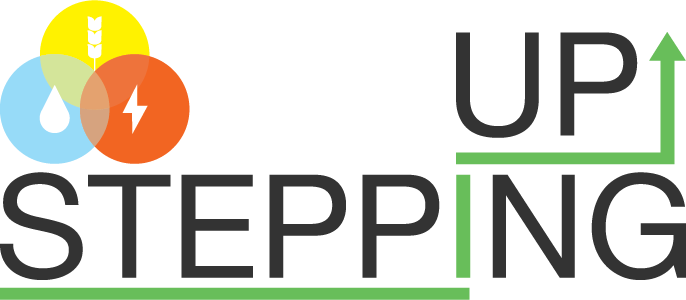About Stepping Up
About STEPPING UP
Typically, options for solving problems facing the food, water or energy sectors are devised in isolation; possibilities for meeting energy needs are explored whilst overlooking the implications for water demand, and visions for land-use change ignore the knock-on effects for agriculture. This siloed decision-making fails to accommodate the interconnections between food, energy and water systems, or to explore the potential benefits and trade-offs of policy and management options. Yet overuse of land, high levels of emissions, increasing inequality, unhealthy diets, more frequent extreme weather events and other challenges threaten the security of resources and place pressure on the economy. Moreover, with targets to mitigate the impacts of climate change elevating uncertainty over how resilient our food, water and energy systems are, stakeholders from industry, government, and civil society, are looking for support and help to make 'good' decisions.
In practice there exist real examples in the UK where these three systems are integrated, where management operates at the 'nexus' of Water-Energy-Food (WEF) systems. STEPPING UP identifies four niche innovations focusing on reducing and repurposing of waste; anaerobic digestion, the use of insect proteins for animal feed or human consumption, the technical recovery of value of waste, and the diversion of surplus food from waste streams to people’s plates. Such examples present possible seeds of transformation, niche examples of forms of integrated management that current socio-environmental challenges necessitate.
Stepping Up identifies four niche innovations, potential seeds of transformation in the agri-food system with complementary benefits for the water, energy, food nexus.
Examples of these case studies may be found at various scales – from household, community and small business to local authorities, catchments and large corporations, and provide new opportunities, new business models and new ways of doing things. But the impacts of such innovations in the context of the WEF nexus are not well understood and there remain complex questions that need answering. What makes such case studies a success? Can they be scaled up, either to function on a larger scale, or to proliferate in their current form? If so, what are the conditions on which scaling up depends, the processes that might enable this to happen, and the barriers that might be faced?
Bringing together an interdisciplinary team with expertise across water, food and energy nexus, the STEPPING UP project looks to improve our understanding of both positive and negative impacts of scaling up these innovations across nexus dimensions. Stepping Up uses a mixed quantitative and qualitative approach to understand the conditions surrounding four case studies and their developments from niche to mainstream operations. We are engaging with stakeholders throughout the project to develop insights into the drivers, motivations, enablers, and constraints experienced by specific innovations. These discussions will lead to an understanding of both the requirements for innovation fostering and growth, and the limits by elucidating the ‘rules’ that govern the behaviour of different actors.
Our interdisciplinary team combine diverse expertise to understand the conditions that enable and facilitate scaling of these innovations, and the possible consequences of their success.
Based on these rules, the team will build dynamic, multi-criteria models of the identified case studies, not only to understand physical attributes such as their sources of electricity or food supply chains, but also how systems of governance, power and behaviour influence their success. For example, the likelihood of farmers installing AD will depend on ‘rules’ such as their responses to costs and expectations of revenues, the experiences of their peers, and their attitudes to risk etc. Using these rules to create an Agent Based Model (ABM) enables the investigation of the potential for the innovations to grow to become mainstream.
In addition to water, energy and food Stepping Up seeks to understand the impacts on greenhouse gas emissions (both CO2 and non-CO2), and other overarching issues.
We will use the models to investigate what the effects to the nexus might be if those innovations are scaled up. We will also be giving particular focus to the effects the innovations may have on the reduction of emissions of non-CO2 greenhouse gases. These may be particularly associated with land use and agriculture. The model will also be used to investigate how those innovations may fare in a world subject to climate change. What happens under conditions of 2°C or 4°C global mean temperature rise? How is food and water availability affected by both the climate change and our demands on the system? By considering what might change over time – e.g. temperature and rainfall – the model will not only test if an innovation can operate at another scale, but also if it works under changing conditions.
We also seek to deliver robust and practical insights to inform policy and management by embedding stakeholders throughout the research.
As well as delivering a package of robust numerical and descriptive insights STEPPING UP has a vision to connect transformational leaders with key stakeholders to catalyse change and step closer to a sustainable Water-Energy-Food (WEF) pathway. Data gathering will involve building solid relationships with stakeholders involved with our case studies, as well as engaging with a wider set of policy and decision makers. These stakeholders will be involved directly in the research and have an opportunity to contribute to the development of a tool to assist strategic decision making of relevance to a range of different scales.
By engaging with case studies and stakeholders throughout they can help inform the research and give it a real world grounding. And of course we welcome any input from interested parties throughout. Please feel free to contact us via Claire Hoolohan.
©Steppingup 2024

